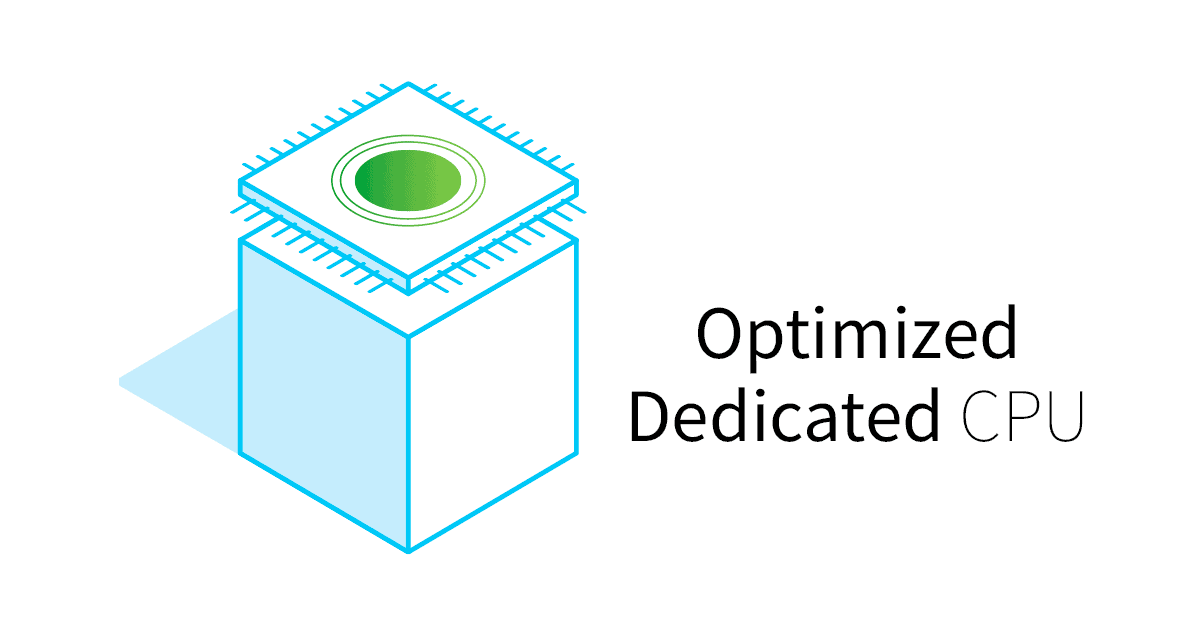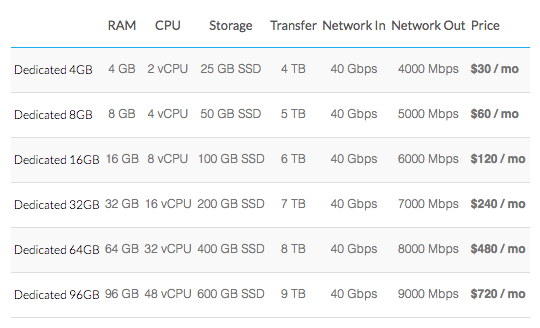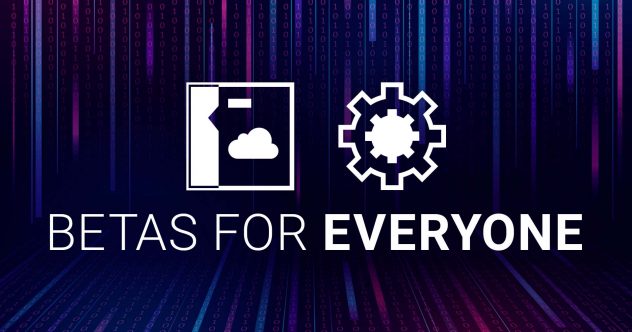Wir stellen unseren neuesten Instanztyp vor: die dedizierten CPU-Instanzen
Dedizierte Instanzen sind für Workloads optimiert, die konstante Performance oder Volllast erfordern (100 % CPU täglich rund um die Uhr). Dazu gehören Buildboxen, CI/CD, Videokodierung, maschinelles Lernen, Spieleserver, Datenbanken, Data Mining und ausgelastete Anwendungsserver.
Die zugrunde liegenden CPU-Ressourcen für diese Instanzen sind dediziert und werden mit niemand anderem gemeinsam genutzt. Die vCPU-Threads einer dedizierten Linode-Instanz sind ausschließlich Kernen und SMT-Threads auf dem Hypervisor zugeordnet, es gibt keine Freigabe für oder Konkurrenz mit anderen Linode-Instanzen.
Wir haben diese Pläne so entworfen, dass sie sehr wettbewerbsfähig sind. Wir wissen auch, dass sie verdammt viel Wert sind.
Besuchen Sie die Preisseite für weitere Details sowie unser gesamtes Tarifangebot.
Dedizierte Instanzen sind in allen Regionen sofort verfügbar. Sie können neue Dedicated Linodes erstellen oder bestehende an einen Dedicated Plan anpassen. Bitte beachten Sie, dass Frankfurt und Atlanta die Verfügbarkeit reduziert haben - wir haben jedoch buchstäblich Hunderte von Maschinen, die in den kommenden Wochen an allen Standorten installiert werden.
Was kommt als nächstes von Linode? Neue Hostingzentren in Kanada und Indien, zudem Objektspeicher, Linode Kubernetes und mehr.
Viel Spaß!









Kommentare (49)
Woo, Canada! 😀
In the same vein, I would love to see GPU instances at some point. I’ve been searching far and wide, and though I’ve found a couple companies that do GPU instances, I’d rather go with someone I trust. 😉
Hi Mike – thanks for your comment. Yup, we’re working on a GPU offering, but it’s super early so not too much to share. I am curious to know what your use-case is…
Cant speak for Mike,
But my use case would be to stream a video game over a VNC connection.
I’d pay 25 a month happily to play video games on a private server rather than own a xbox.
Sure. My use case is bit unusual: Running a game client (requiring access to a graphics API like OpenGL or Vulkan), capturing the frames/audio stream, and encoding it as a video.
This is still in the concept phase though. First step was to find a GPU enabled VPS server we could run some tests on, and figure out what our constraints are.
Nice! I appreciate this offering. Any chance that you can let us know where at in Canada? Also, any news on updating the fleet (standard plans) to use some newer CPU’s? I see some Intel Xeon Gold 6148’s and some AMD EPYC’s in the mix, but not many. Finally, I’d love to be able to swap IPv6 addresses like we already can with IPv4’s. Any chance for that? Thanks!
Josh,
From the docs:
Additional IPv6 Addresses
You can request additional IPv6 addresses at any time by opening a support ticket. While default IPv6 addresses are configured automatically, you will need to statically configure each IPv6 address in the pool you request. See our static IP guide for instructions on how to do this.
How about Australia? We have some government/healthcare/education clients who are irate that we’re in Singapore, and one who insisted we moved to Australia which left us no choice but to move them into AWS; I’d prefer to not need to do this again.
What happened to Limestone CDN?
Very interesting, but I think in 2019 the disk space is too small. The cost of the SSD is very low now to only 25 Gb in an instance of $30.
Mike/Christopher: what you’re after is what Shadow are offering….
I am a bit disappointed by this, to be honest. You copied 1:1 the offering of Digital Ocean: RAM, CPUs, SSD size, transfer – all exactly the same. Your price point is a bit better, but that’s the only difference.
From an innovative provider, I would expect to think about what offering makes sense, and not to simply copy the competitor, at a slightly better price.
It doesn’t make any sense, that the disk size is so limited. A very nice offering would have been for example a lower tier, i.e. 2 GB ram, 1 vCPU dedicated.
So your price is 25% cheaper than DO. But is the performance the same? I have tested a couple of instances on Linode, and all of them were running on the same hardware that I see on standard Linodes. On DO, the dedicated droplets run on faster hardware. Test results for sysbench:
– Linode: Around 750-950 events per second
– Digital Ocean: Around 1200 events per second.
=> Linode is 25% cheaper than DO, but it is also 30% slower than DO.
What are your plans on upgrading the hardware? If I go for dedicated CPU, I would expect better hardware, and not just less noisy neighbors.
Re: GPUs – thanks for the info. Very much in line with what we’ve been thinking, too.
Re: new DCs: Our Canada DC is in Toronto and should be online near the end of this quarter! We have a team there now completing the install. India is close behind (which has been over a year long process). Australia will be up next before the end of the year (and maybe sooner) but we’re still midway through our process, there.
Folks, this is the first iteration of our dedicated offering, and as such we’re emphasizing the “dedicated”-ness – that you can spin to 100% CPU all the time, without worry. So, benchmarks may vary depending on the type of machine you land on. As I mentioned, we’re spooling up the deployment of new machines to all DCs, and have many machines inbound. This will give us more options in the near future, like potentially limiting these instance types to only newer kit or adding more resources to the plans (as we’ve always done).
Thanks for the comments!
What about Managed Kubernetes and/or Managed Postgres? Is there some date/early plan to share? 🙂
I’m going to get myself in trouble with our internal teams if I keep giving out dates :), buuut: we are actively working on our managed Kubernetes offering (managed masters, auto node provisionment, etc) and are targeting Q2/Q3 for early adopters.
Managed Database is something we’re looking into, likely up to bat after the stuff I’ve mentioned already. Thanks!!!!
So if i spin up 20 Dedicated 4GB nodes, that will get more work done than if i spin up 30 Linode 4GB.
If a random person takes a look at the price page, he will always pick up the Linode 4GB nodes because that gives more resources, because nothing ( from the price page ) suggests that the Dedicated nodes are better ( for some work ) . So CPU heavy apps will still end up on the shared nodes
Sandor – totally agree – the pricing page needs an update and we’ll add some sentences to the add-a-Linode tab, too – explaining the differences between the plans and the use-cases they’re good for. We do have a guide that explains the differences: https://www.linode.com/docs/platform/how-to-choose-a-linode-plan/ Thanks!
Looking forward to the Canadian offering! Does that mean Canadian dollars? And what about taxes?
Conrad: Great! Invoices will still be in USD, but (and don’t quote me on this since tax is complex), pretty sure we must collect and remit tax to Canada for non-business customers with a Canada address on file.
Linode is stepping forward to future by opening Datacenter in India and it will dynamically acceptable by loyal customers of India and will start moving towards Linode.
Caker: Would be great if you could find a way to involve CAD currency!
Love, love, love this! Will migrate some of my instances for sure.
The main issue I have with Linode is having a NodeBalancers capable of handling more than 10k concurrent connections. I have a lot of websockets connected on my site and creating a HA+LB setup without using NodeBalancers is very expensive.
Eduardo: Glad to hear you’re as excited about Dedicated CPU Instances as we are! We’ve added your NodeBalancer feedback to our internal tracker, and will keep a connection limitation increase in mind for future revisions of the service.
Very nice to finally have dedicated CPUs on instances!
How does this compare to the standard offering? What is the CPU configuration of standard machines? Are the CPUs pinned to cores that are shared with another host or are they floating between all cores on a machine? How oversubscribed are the standard CPUs?
Azure similar offering has specific details about CPU (“… The F-series is based on the 2.4 GHz Intel Xeon® E5-2673 v3 (Haswell) processor … “).
Any chance you could provide us with that level of detail or at least the different options of CPU we could be assigned?
Great to hear. We’ve been having frequent performance problems related to CPU steal on the standard instances, and ordering larger instances was not solving the problem. I’ve seen severe network slowdowns as well as CPU bottlenecks with steal at ~2% (reported by mpstat). We never see these problems when steal is less than 1%. We’ll continue to monitor performance and move some of our instances to dedicated. Are all dedicated currently on Epyc? I’ve only spun up one so far to check steal rate (so far, steady at 0.00).
Matthew: CPU resources that are utilized in Dedicated plans aren’t shared with Standard plans. We strive to keep CPU resources in use for Standard plans untaxed, though Dedicated plans will provide more consistent performance, as their processing won’t be affected by other Linodes on a host.
Rolando and Brad: Yes and (partly) yes: we employ both Intel Xeon and AMD EPYC processors — you can always check which processor your Linode is running on with ‘lscpu’ (assuming you’re running Linux). It’s basically up to chance on which type of CPU your Linode will use. We can’t make any promises, but we might be able to help you get on a specific processor type if you reach out to Support.
Super excited and happy to hear that you will be expanding into India!
Great job guys!!! 😀
I think the low SSD space makes no sense.
I could migrate two of my 4GB Linodes to the dedicated CPU ones but the disk space isn’t enough. You need to fix this.
I’m confused. If we are currently paying for an 8 core plan. Does that mean that is 8 core in a good day and barely 1 on a bad day?
Great to see Linode coming to India. We’ve had to put all our Linodes (about 30 of them) in the Singapore DC so far. I also hope your India operations will be under an Indian entity and the GST tax setup will be better than D.O’s.
Guys, you need to support the local disk size of a similar memory Standart Linode instance. Start with 80GB at least. That’ll encourage us to easily migrate to dedicated cpu plans and also move you a little bit ahead in competition with Digital Ocean.
Dedicated CPU – very good news indeed. A bit too late for us unfortunately, since the spectre/meltdown patches our applications ran into the ground on Linode, suffering CPU steal and basically performing 40% worse than before. So we have just completed a migration onto bare metal where we found that same-size VMs would work at least twice as fast as the “same” configuration on Linode. So we only have a fraction of our former fleet left on Linode now, which was very sad for us after many years of previously good performance. We won’t stop using Linode but we have a much narrower set of use cases now.
Regarding Disk allocation on Dedicated instances, I echo the other commenters. Needs to be 2x the SSD allocation, at this price, to make sense, in my opinion.
losif, Gokalp, and Paul: Thanks for the feedback on Dedicated SSD storage. We’ve noted your comments on our internal tracker and will look into providing more options for our Dedicated CPU offerings.
Since I heard about the dedicated CPU offering, I was rather eager to try it out, and with some trial and error, and a support ticket, finally have a nice, stable Linode going with CPU resources of my own! I may not use a lot of CPU resources, but what I do use has turned out to be excellent to have CPU completely to myself. Once again, another superb offer from Linode! I can’t wait to see what comes next!
I would like to see dedicated CPU plans based on frequency-optimized server CPUs. A modern core running at ~3.5ghz is a significant improvement over E5 Xeon cores at 2.4ghz.
Single-threaded performance matters in many workloads.
I like the GPU idea someone mentioned. Not sure how much I would use it, but with all of these new cryptocurrencies coming out, I can imagine wanting to setup a node to create dapps.
Hi Linode, I would very strongly echo losif, Gokalp, and Paul’s comments. The disk size is seriously lacking, and it prevents a like-to-like migration; we are with Linode for a long time, and we would have expected a more competitive offer than Digital Ocean…after coming to the party later
Thanks for Indian data center, it is a must because we struggle a lot for hosting local websites. I will be waiting for its roll out.
I would like to know if it´s possible to upload a pre existing VMware on Linode Standard or Dedicated servers.
Thanks a lot
I hope that Canadian data centre becomes available soon. “End of this quarter” would have been the end of March, and we’re nearing the end of April now.
Matthew: Our Toronto data center is currently in beta. You can try it out right now — see this Community Site post for details.
To all the disk wanters, you could add some block storage FWIW… 🙂
Hey Guys Quick Question: Any ETA on the India data centre…
Hi @caker any news on the GPU offering?
We need to do some light video editing with big files in AWS, then video livestreams to many users from a location where the network and machine is stable. Our local bandwidth is sometimes heavily taxed by other activity. Does this use-case make sense, not sure of pricing. Thanks
Our upcoming India data center and GPU offering are still in the works, so stay tuned to this blog for updates. Thanks for sharing those details with us, Mark. I’ve passed on your use case to our GPU team. You could further help us shape our work by taking this survey.
1. What happened to LimeStone CDN integration ?
2. With EPYC 2 looming, will there be one day with 1:1 vCPU and RAM config, given that vCPU is just one CPU thread anyway. I think 1:1 for Dedicated CPU instances could be attractive.
3. Will there be Managed PostgreSQL offering?
Hi Ed – Regarding CDN integration, we’ve partnered with Limelight on this. If you are interested in their CDN service I’d recommend contacting our Sales team about this:
https://www.linode.com/contact
> With EPYC 2 looming, will there be one day with 1:1 vCPU and RAM config, given that vCPU is just one CPU thread anyway. I think 1:1 for Dedicated CPU instances could be attractive.
That’s a great suggestion. I’ve passed it on to our product development team for further review. If you have any other feedback to share, feel free to pass it along to feedback@linode.com.
> Will there be Managed PostgreSQL offering?
This consideration is on our roadmap. I’ve added your request for this to our internal tracker as well.
I keep checking back hoping to find high CPU frequency based options. We’ve had really great performance on other platforms where rather than dedicated CPUs we were able to get faster CPU frequencies and storage (NVME).
I don’t want to migrate my instances away from Linode but at some point the performance discrepancies are going to make this a necessary business decision. Already the costs per month to upgrade form Linode standard instances to other High Frequency/High Performance Storage instances are very small.
Hey Nat, thanks for the feedback.
Can you give me more specifics? What sort of specs/what sort of CPU frequency would you like to see?